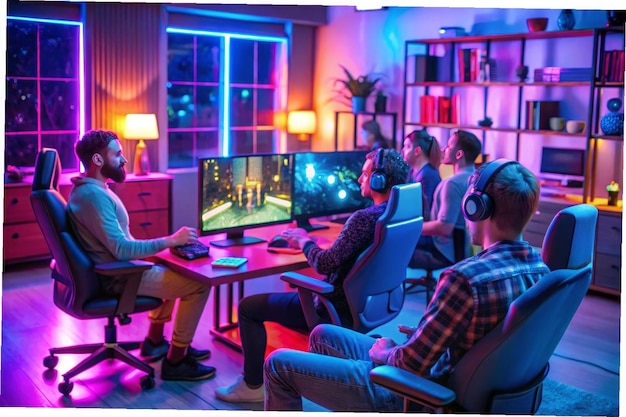
3D GAME ART PRODUCTION
Create stunning visual assets for modern game development using industry-standard tools and workflows
ABOUT THIS COURSE
This comprehensive course covers the complete pipeline for creating professional 3D game assets. Participants learn industry-standard workflows for modeling, texturing, and optimizing assets that meet modern game development requirements. The program emphasizes practical application through portfolio-building projects that demonstrate production-ready skills.
Students work with Blender for low-poly modeling and animation-ready topology, Maya for professional production workflows, Substance Painter for PBR material creation, and ZBrush for high-resolution sculpting. The curriculum covers the complete process from concept to game-ready asset, including UV mapping, texture baking, and LOD optimization.
The course addresses both character art and environment creation, providing participants with versatile skills applicable across different game development roles. Through guided projects and individual work, students build a portfolio that showcases their ability to create assets suitable for real-time rendering in modern game engines.
WHAT YOU'LL LEARN
- Character modeling with proper topology
- Environment art and prop design
- PBR material creation and texturing
- UV mapping and texture baking
- Low-poly optimization techniques
- LOD systems and performance optimization
COURSE STRUCTURE
- Hands-on practical sessions
- Individual project guidance
- Portfolio development focus
- Industry workflow training
- Instructor feedback sessions
- Technical problem-solving workshops
SKILLS AND OUTCOMES
Graduates develop a comprehensive skill set that positions them for various roles in game art production. The course emphasizes creating a portfolio that demonstrates technical proficiency and artistic capability, showcasing work that meets industry standards for game-ready assets.
Participants complete multiple portfolio projects including character models, environment dioramas, and weapon collections. These projects demonstrate understanding of production pipelines, optimization techniques, and the ability to work within technical constraints typical of real-time game development.
Build production-quality assets demonstrating technical and artistic skills
Learn efficient pipelines used in professional game development studios
Master optimization and performance considerations for real-time rendering
TOOLS AND TECHNIQUES
PRIMARY SOFTWARE
BLENDER
Low-poly modeling, UV unwrapping, animation-ready topology, and basic material setup
MAYA
Professional production workflows, rigging preparation, and studio-standard processes
ZBRUSH
High-resolution sculpting, detail creation, and normal map generation
SUBSTANCE PAINTER
PBR texture creation, smart materials, and real-time material preview
TECHNIQUES COVERED
TOPOLOGY OPTIMIZATION
Creating clean edge flow for deformation and animation
TEXTURE BAKING
High to low-poly normal map and ambient occlusion transfer
LOD CREATION
Building level-of-detail variants for performance management
ATLAS OPTIMIZATION
Efficient UV layout and texture space utilization
FACILITY EQUIPMENT
Students work with professional-grade hardware configured for 3D production workflows. Workstations feature graphics cards capable of real-time viewport rendering, multiple monitors for efficient workflow organization, and calibrated displays for accurate color representation.
The training environment includes drawing tablets for digital sculpting, reference libraries of professional game art, and access to game engines for asset testing and validation in real-time rendering contexts.
PROFESSIONAL STANDARDS
The course emphasizes professional asset creation standards used throughout the game development industry. Participants learn naming conventions, file organization systems, and version control practices that facilitate team collaboration and project management.
Technical requirements for game-ready assets are covered comprehensively, including polygon budgets for different platform targets, texture resolution standards, and performance optimization techniques. Students learn to balance visual quality with technical constraints typical of real-time rendering.
ASSET STANDARDS
- • Consistent scale and proportions across all assets
- • Clean topology with proper edge flow and quad-based geometry
- • Efficient UV layouts maximizing texture space utilization
- • Organized material assignments and naming conventions
- • Proper pivot point placement for animation and placement
WORKFLOW PRACTICES
- • Systematic file organization and version management
- • Non-destructive modeling techniques for iteration
- • Regular backup procedures and project archiving
- • Testing assets in target engine environments
- • Documentation of technical specifications and requirements
WHO THIS COURSE SERVES
ASPIRING GAME ARTISTS
Individuals seeking to enter the game development industry with a focus on visual asset creation. The course provides comprehensive training in the technical and artistic skills needed for 3D art production roles.
Participants build a portfolio demonstrating proficiency with industry-standard tools and workflows, preparing them for entry-level positions in game art departments.
TRADITIONAL ARTISTS
Artists with background in traditional media or other digital art forms looking to transition into game development. The program bridges the gap between artistic skills and technical requirements of real-time 3D art.
Training covers the unique considerations of game asset creation, including performance optimization and technical constraints specific to interactive entertainment.
HOBBYIST DEVELOPERS
Independent game developers seeking to improve their 3D art skills for personal projects. The course emphasizes efficient workflows and techniques suitable for small team or solo development.
Participants learn to create production-quality assets while working within the time and resource constraints typical of independent development.
SKILL UPGRADERS
Current game industry professionals looking to expand their skill set or update knowledge of modern tools and techniques. The program covers contemporary workflows and recent developments in game art production.
Training addresses current industry standards and emerging techniques, helping professionals stay current with evolving production methodologies.
SKILL DEVELOPMENT TRACKING
Participants receive regular feedback on their work through individual review sessions with instructors. Each project milestone includes assessment of technical execution, artistic quality, and adherence to production standards.
Progress is measured through completed portfolio pieces that demonstrate specific skills and techniques. Instructors provide guidance on areas for improvement and suggestions for further development of individual strengths.
Regular completion checkpoints with instructor review and feedback
Evaluation of technical proficiency and workflow efficiency
Building presentation-quality work demonstrating capabilities
START YOUR 3D ART JOURNEY
Connect with our team to discuss enrollment in the 3D Game Art Production course and begin developing professional skills in game asset creation.
CONTACT US NOWEXPLORE OTHER COURSES
UNREAL ENGINE DEVELOPMENT
Master Unreal Engine 5 for creating cutting-edge games with photorealistic graphics. Learn Blueprint scripting, C++ programming, and advanced rendering techniques.
GAME AUDIO & MUSIC PRODUCTION
Produce professional audio experiences that enhance gameplay and emotional engagement. Learn sound design, music composition, and interactive audio implementation.